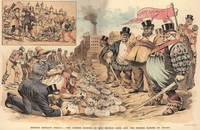
Cringely gets anxious over
Google’s floor bid for 700Mhz.
After pointing out that Verizon and AT&T coming around
to Kevin Martin’s leaked counterproposal of watered down
“open access” rules, he says:
Look who Google is up against — all the largest Internet service
providers in the U.S. Google will not win this even if they win the
auction, because the telcos and cable companies are far more skilled
and cunning when it comes to lobbying and controlling politicians than
Google can ever hope to be. The telcos have spent more than a century at
this game and Google hasn’t even been in it for a decade. And Google’s
pockets are no deeper than those of the other potential bidders.
—
Is Google on Crack?: Eric Schmidt bets the ranch on wireless spectrum,
Robert X. Cringely,
Pulpit,
27 July 2007
Cringely is missing the point about who Google is up against.
These outfits have not been the largest ISPs for more than a century.
They’ve been
telephone companies for more than a century.
And being around for a long time isn’t necessarily a sure win.
Look at the Vatican; it’s been around for two thousand years,
and it’s managed to lose most of its traditional heartland of Europe.
Sure, Google is fragile, in some senses even more fragile than
Microsoft, as Cringely points out.
But even
Microsoft is losing market share from IE to an open source
browser, Firefox.
Google, as a proponent of open source that actually understands it,
has a fair chance here.
The incumbent duopoly telcos aren’t really in the Internet business;
Google is.
Maybe Cringely’s right that Google alone couldn’t win the auction.
But Google and Sprint possibly could.
Sure, Sprint is a phone company, too.
But that doesn’t mean it’s going to side with the rest if it scents profit.
Maybe with a little help from Apple.
Let’s hope that’s what Google is really up to,
rather than expecting to get Martin to change the rules
and then wait for AT&T to deliver another striped bass.
I also don’t think Cringely is taking into account the stakes here.
Continue reading →



